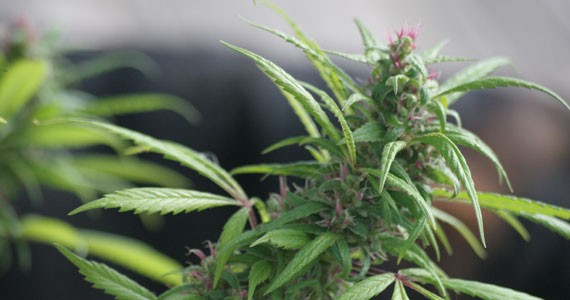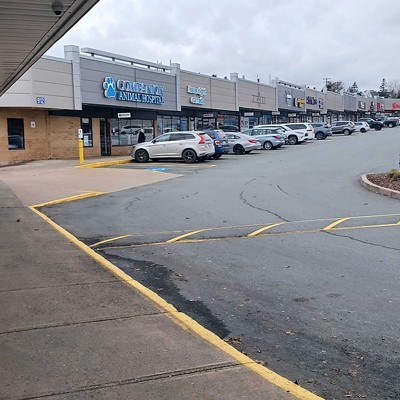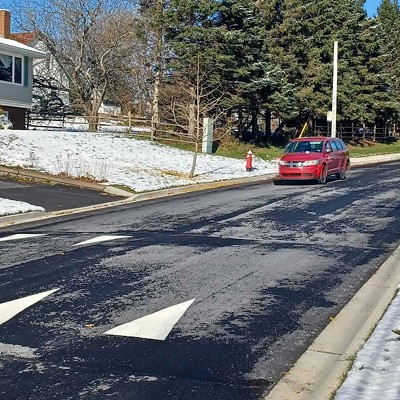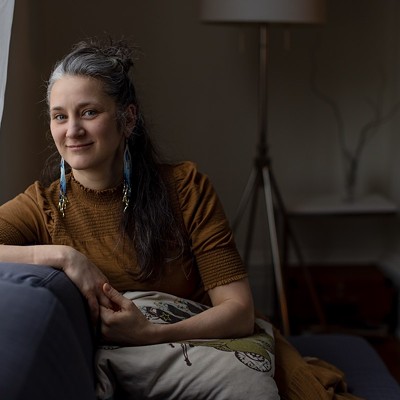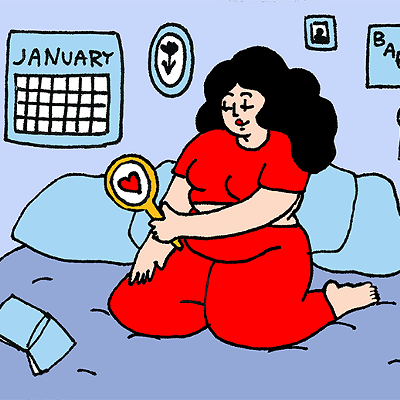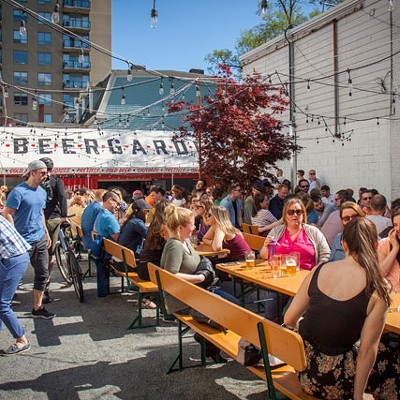In an early-'90s Civic we drive eastward, away from the Halifax-Dartmouth sprawl, toward the tiny hamlets and villages that tuck themselves into the myriad bays and coves of the eastern shore. In the car the conversation flits quickly from topic to topic, like some conspiratorially minded hummingbird, and runs the gamut of water-cooler fringe-news talk. A speech on the dangers of fluoride in the water leads to a dissertation on chem trails, which effortlessly flows into an account of the real story behind 9/11. The only way through it is to allow each topic to run its course, and then gently, calmly, try to ease the derailed interview back onto track. I want to know about cannabis: medical-grade, Health Canada-approved marijuana, to be precise. Jes James, co-founder of The Halifax Compassionate Club, with whom I am now delivering an indeterminate quantity of medical marijuana to as many patients as we can schedule in the day, is my tour guide.
The 50-something James has rheumatoid arthritis. Like many auto-immune diseases, in which the body attacks its own cells, rheumatoid arthritis presents itself under a spectrum of symptoms. To James, who was diagnosed at age 13, rheumatoid arthritis meant a lifetime of inflammation-based pain.
Western medicine tends to treat rheumatoid arthritis with doses of cortisone, or other anti-inflammatory steroids. James, allergic to anti-inflammatory steroids and worried about the side effects of long-term use, began to research alternative medicines. That's when she took on the alias of the famous train robber, and started using cannabis to treat her ailments.
"Twelve years ago, I was bedridden for six months," says James. "I had used cannabis, but this was before I started using it medicinally. Without it, by now I'd be in a wheelchair."
The effects were so beneficial that James became one of the Maritimes' most avid cannabis crusaders. Most days James plays "catch me if you can," skirting the grey areas of legality, delivering bags of marijuana to Nova Scotia's sick and needy and solidifying relationships between prospective clients and ever-needed growers.
"We have about 100 clients in active files," says James, as we turn lightly onto a gravel road. "We're always looking for growers for patients. We always have more patients than growers...Part of the process of finding growers and weeding through them is trying to get into a dialogue, and get their trust, to the point where we can start talking about the actual nutrients, and pesticides and cultivation techniques they're using."
Our first visit is to Tim, from Pugwash. Tim lives in a detached home, set well back from the main road, which by now is just a gravel cut running through the Acadian forest. There is a calm in the breeze, and James' staccato, train-of-thought delivery has a flowing quality to it that lets the mind breathe.
"What's happening is that patients are hitting a wall right away," says James, ringing the doorbell. "In small towns, this is really common. They do not want their doctor to know that they use cannabis. The doctor is often a family friend. Or you come across medical clinics with a No Cannabis policy, so the doctor can't talk to you about cannabis even if he wanted to. If patients have a doctor who won't speak to them, we help them find a doctor who will."
Tim, using a walker, a fat black retriever with a wagging tail in tow, answers the door. We sit on overstuffed couches, and James proffers Tim a bulging sack of pungent buds. Tim's story, of course, is unique to Tim. But within it runs the standard thread of the self-medicating, rural Nova Scotian.
Tim has hereditary spastic paraplegia. It is a crippling ailment which starts in the legs and works its way up. The sufferer carries the disease for years, unencumbered. And then, very rapidly, usually around middle age, the afflicted watches the body simply collapse. It is genetic, often effects a complete generation of siblings and largely considered to be irreversible. Tim, increasingly couch-bound, understandably depressed, had never tried marijuana. There isn't a strong cannabis culture in Nova Scotia among the older generations. But, having recently lost control of his sphincter, and quickly losing control of hope, Tim took a puff of an offered joint. And then another. And another. And then Tim got off the couch.
"I don't shit in a bag anymore," says Tim, opening the back patio door. His deck is fringed with fat, bushy, marijuana plants. Gorgeous, red-haired buds, caked in crystals, shimmer in the mid-day sun. James is giddy as she examines Tim's crop. The red-haired buds are a rare find, and she carefully snips several grafts for cloning. It looks to James like a Red Cross, a high-quality strain with a medicinal history, more commonly found in California. And apparently, it has found its way to Pugwash.
"It's a completely different dynamic if you live in a city like Toronto or Vancouver," says James, holding the bud to her nose, breathing deep. "If you have a legitimate medical condition you can go to one of these clubs and immediately access the highest quality cannabis on the market."
In Nova Scotia, however, James is currently it. The Halifax Compassionate Club is the only dispensary east of Montreal. What that means, in the province with the highest cancer rates in the country, where almost half the population still lives rurally, is that James is constantly moving. She's delivering, growing, informing and connecting. If you keep your ears open to the hum, Nova Scotia is a constant flood of stories of suffering. People don't know how to get legal---or even good---marijuana, or they don't even know that cannabis might be a treatment option. Navigating the Marihuana Medical Access Program, Health Canada's document-laden licencing program, can leave sufferers in a bureaucratic funk. Meeting with James is often the first step toward relief.
"I had a prof whose wife had MS," says James, as we leave Tim waving on the porch steps. "He would have to go to the street to find cannabis for his wife. She had a licence, but she had no source. And this is what people want to avoid. Nobody should have to go to street level drug dealers to buy their cannabis from unknown sources. I'm not saying those are bad sources, but if you don't know that person, it could be anything."
"How do you get a licence?" I ask.
"Right now the entire medical marijuana regulations have been struck down. There is no medical marijuana regulation in Canada whatsoever," says James. "The Matt Mernagh case in Ontario has changed everything."
Wait. What? No regulations? But what about all the Health Canada forms to be filled out in triplicate, and doctors' notes, and passport-sized photos? And registering your name and address with the RCMP?
Matt Mernagh is not hard to find. The man wears his marijuana use on his sleeve, and has literally dared the current Harper government to stop him. If Mark Emery, sitting behind bars in a federal prison in Seattle, Washington, is Canada's prince of pot, Mernagh is most certainly among Canada's royal family of cannabis.
"I'd been growing myself for about 15 years, and I was doing it 'illegally,' I guess you could say," says Mernagh, excusing himself momentarily from a wake and bake session in Vancouver as we chat on the phone. "I got caught about four years ago. I hired a lawyer named Paul Lewin while I was in prison, and the first thing that Mr. Lewin said to me was that he'd like to do a constitutional challenge on my behalf because he knew my situation."
Mernagh suffers from fibromialgia, scoliosis, depression and seizures. He also writes some of the best pot reviews on the internet. He took the federal regulations on marijuana to court, had them overturned, and has become a marijuana hero in Canada in the process.
"We went to court and we proved last year that there was no way to get into the medical marijuana program, by my own testimony," continues Mernagh. "We also had 22 witnesses in total, that said 'Hey, I'm like Matt Mernagh. I can't get into this program either.' And we used people from across Canada. And that's important because we found that some provinces, and even some cities are quite dramatically more well-off than other places, and Health Canada uses that to spike their statistics.
"Some people have access to medical marijuana, and some people have no access to medical marijuana. Everybody has different types of opportunities. It depends on where you live. It depends on who you know," says Mernagh. "There were all these flaws with the medical marijuana plan that we brought to court. And the judge agreed with us, so he gutted it. And by gutting it I mean he absolutely destroyed the medical marijuana program. He said 'This program is not needed,' and that the government has 90 days to make efforts to make a new medical marijuana program. But this medical marijuana program has to take into account that the patient comes first. My choice to use cannabis is my choice. It's not my doctor's choice. It's not the government's choice. This is my choice."
These were the heady days of April 2011. And for a moment in time, it appeared as though marijuana prohibition in Canada might just come crumbling down.
But the empire struck back.
Almost immediately after Ontario superior court justice Donald Taliano struck down the marijuana laws, the Harper government appealed the decision. Then, on June 17 of 2011, Health Canada issued a cryptic press release stating that Federal Health Minister Leona Aglukkaq would be looking to improve the Marihuana Medical Access Program. The program, as it stands, is the de facto set of rules that governs who can consume cannabis on medical grounds. And while there are those like Mernagh who are spearheading the legal battle to set the entire program on its head, thousands of others across the country have applied to, and have been granted, the legal right to self-medicate their respective conditions through cannabis consumption. Nova Scotia, per capita, has the most licenced medical cannabis users in the country (see sidebar).
Jes James and Tim from Pugwash are among those who have been granted "grow licences" by Health Canada. They are legally allowed to grow their own medicine. Aglukkaq's press release suggests that grow licences will be eliminated. Aglukkaq bases this strategy on the suggestion that the Access Program is ripe for infiltration from the criminal element, and that needed improvements will make safer our nation's "children and communities." Tellingly, the press release notes in no uncertain terms that legalization or decriminalization of cannabis is not an option on the table. The impending Mernagh appeal is not even alluded to.
When I contacted Health Canada on the matter, and asked for proof about increased criminal incursions into the field of medical marijuana, media relations officer Gary Scott-Holub withdrew behind claims related to the health and safety of the program, and the perceived "risk of home invasion." There are no statistics to back the federal government's suggestion of increased criminality in the Access Program, only broad-based fears and suggestions of a greater good for the so-called greater community.
After Aglukkaq's press release, Health Canada then held a series of stakeholders' meetings in Vancouver, Montreal and Toronto. These meetings, the last of which wound up on September 15, 2011 in Toronto, were ostensibly meant to gather feedback on the proposed scrapping of grow licences.
Ted Smith, founder of Cannabis Buyers Clubs of Canada, a compassion club that operates out of Victoria, was invited to participate in the stakeholder meeting in Vancouver. His feedback, he was told, would be taken into consideration. Not so, says Smith. He thinks that the stakeholders' meetings were nothing more than a dog and pony show in which Health Canada's mind was already made up, and those concerned with keeping patient access to medical marijuana at the forefront of the agenda were shuffled to the sidelines of the conversation. All signs point to grow licences being scrapped by 2013, regardless of the evidence that suggested that they are facilitating access for those who depend on cannabis for their health.
"It's obvious that Health Canada doesn't really consider the patients to be important stakeholders in this process, and they seem intent upon taking patients' rights to grow their own medicine away," says Smith from his home in Victoria. "I doubt if anything that we said would have been able to stop them. They have political bosses to answer to, and the bureaucrats at these meetings might be really nice, but the people above them, [not so much]. In essence they were asking for help in putting us out of business or sending us to jail, for a program that it appears would give a small number of large companies control over the marketplace. So it really appears to be playing into the hands of large drug companies, at the expense of patients and their caregivers."
Health Canada's findings and recommendations in this matter are slated to appear in an upcoming issue of the Canadian Gazette, Parliament's public record of its goings-on. All signs point to individual grow licences being slated for the chopping block, to be replaced by a large-scale, commercial system of contract growers.
"Health Canada is proposing to put a new supply and distribution system in place that uses only fully regulated, inspected and audited licensed commercial producers," says Gary Scott Holub, Health Canada's media rep. "These licensed commercial producers would be regularly inspected and audited by Health Canada to ensure that they are compliant with all applicable regulations."
Removing individual grow licences stands to severely complicate patient access to their medicine. And this is compounded by the fact that Health Canada's attempts to grow its own marijuana have, according to licenced users, failed drastically in the past. The one grower currently under contract to Health Canada, Prairie Plant Systems, grows notoriously ineffective marijuana 1,000 metres underground in an abandoned mine shaft in Saskatchewan. The Health Canada shwag is then Gamma-radiated in Quebec (ostensibly to remove mould), a process that many worry might destroy the medicinal properties of the cannabinoids in the weed.
"They dilute their weed with leaf and stalk," says Jes James, now back home, seated at the kitchen table. The mood has become decidedly serious. "It is nothing anybody wants to smoke. Do you know how many patients have written letters and said 'I will come and work for you for free. Let me help you. You are obviously unable to do this job.' Many people have sent that letter."
Of course, there is also the not-insignificant spectre of a third piece of legislation. Bill C-10, affectionately referred to as the Omnibus Crime Bill, looms in the near future. Attached to Bill C-10, passed through Parliament and now before the Senate, are mandatory minimum penalties for growing marijuana. The minimum penalty for growing between six and 200 cannabis plants is six months imprisonment. The minimum penalty for growing between 201 and 500 plants is one year's imprisonment. And the minimum term of imprisonment is two years if the number of plants produced is more than 500. There will be no judicial discretion, no extenuating circumstances, no choice in the matter.
"The timing of mandatory minimums and the closing down of personal grows is not coincidence," says Chris Enns, seated across from James at their shared kitchen table. Enns, co-founder of The Halifax Compassionate Club, is also the owner of an online head shop. "There are patients that are going to continue to grow for themselves regardless of what the government says. There will be people in wheelchairs and walkers in their court systems, clogging up their court systems. That's what's going to happen. What we're going to do, is we're going to end up in court within a week of them implementing these new regulations."
"We're going to fight them in court," agrees Ted Smith from Victoria. "It seems to be the only way our government will listen on this issue, or any progressive drug policy issue. The Conservatives are bent upon putting in crime bills and throwing people in jail that engage in illicit drug use. The courts appear to be our only refuge from our government at this point. Clogging the courts...it's an expensive and time-consuming process. And a lot of people are going to suffer and die prematurely from a lack of cannabis care."
Back at the wheel of her makeshift ambulance, driving down another gravel road to meet a grandmother in Preston with a cancerous brain tumour who's in need of some weed, James looks pensive. It strikes me that regulations or no, James will strive on. This is Nova Scotia, after all, home of North America's first documented hemp fields.
"We're prepared to fight," says James, gazing off into middle distance. "But we're also prepared for the outcome."
Miles Howe is a freelance journalist and the Halifax-based editor of the The Dominion.
Rick Simpson, hemp crusader
Front-line cannabis crusader Rick Simpson, hailing from Maccan, Nova Scotia, might be one of the main reasons that Nova Scotians are the most licenced, per capita, medical marijuana users in Canada.
For years, Simpson grew mass quantities of marijuana in the rural Nova Scotia town. He turned pound upon pound of bud into essential oil, a product that he called hemp oil, and distributed it---free of charge---to the ailing masses. Soon enough, first-hand testimonials of miracle healings began to surface out of the Maccan area. From chronic pain to glaucoma to cancers of all types---a medical revolution appeared to be underway.
Meetings of hemp oil converts began being held at the Maccan Royal Legion, that is, until the Legion stepped in, fired the president and locked the doors. In 2005, the RCMP began a series of raids upon the Simpson estate. They seized 1,600 plants, and sparked a legal battle that lasted for the next two years. In 2007 Simpson was found guilty of possession for the purpose of trafficking and growing marijuana. He classically noted to the judge, when discussing his sentencing, “It may be better to lock me up right now. As soon as I get home I’m going to treat my patients. I’m going to grow that plant until the day I die, so I might as well be put in jail today. I can’t stop in the middle of [treatment]. People’s lives are at stake here.”
The chronic persecution of Simpson had begun, however, and resulted in further raids upon his house. Things culminated in 2009, while Simpson was in Amsterdam receiving the heralded High Times Freedom Fighter of the Year award at the Cannabis Cup. The RCMP had raided his house the day before, and he would be immediately arrested on charges if he were to return to Canada. He announced to the cheering crowd at the Cup that he would be seeking marijuana asylum in Europe, where he might more easily grow pot, and make his hemp oil.
Simpson is currently in Croatia, where he continues to tout the amazing medical properties of cannabis.
To learn more about Rick Simpson story, see “Run From the Cure” on YouTube. --MH

